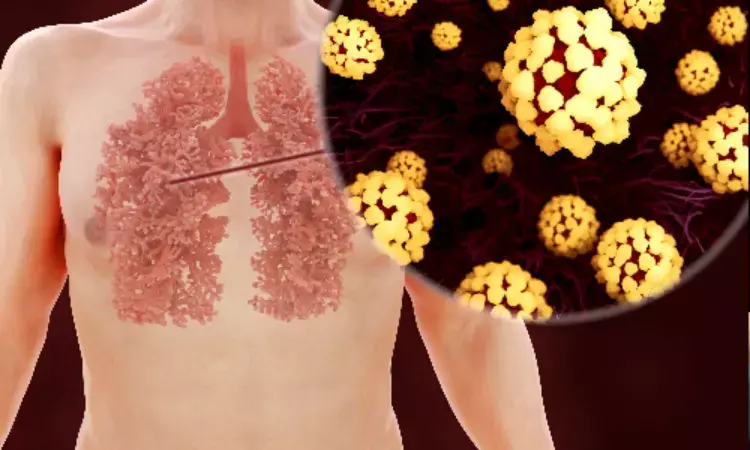- Home
- Medical news & Guidelines
- Anesthesiology
- Cardiology and CTVS
- Critical Care
- Dentistry
- Dermatology
- Diabetes and Endocrinology
- ENT
- Gastroenterology
- Medicine
- Nephrology
- Neurology
- Obstretics-Gynaecology
- Oncology
- Ophthalmology
- Orthopaedics
- Pediatrics-Neonatology
- Psychiatry
- Pulmonology
- Radiology
- Surgery
- Urology
- Laboratory Medicine
- Diet
- Nursing
- Paramedical
- Physiotherapy
- Health news
- Fact Check
- Bone Health Fact Check
- Brain Health Fact Check
- Cancer Related Fact Check
- Child Care Fact Check
- Dental and oral health fact check
- Diabetes and metabolic health fact check
- Diet and Nutrition Fact Check
- Eye and ENT Care Fact Check
- Fitness fact check
- Gut health fact check
- Heart health fact check
- Kidney health fact check
- Medical education fact check
- Men's health fact check
- Respiratory fact check
- Skin and hair care fact check
- Vaccine and Immunization fact check
- Women's health fact check
- AYUSH
- State News
- Andaman and Nicobar Islands
- Andhra Pradesh
- Arunachal Pradesh
- Assam
- Bihar
- Chandigarh
- Chattisgarh
- Dadra and Nagar Haveli
- Daman and Diu
- Delhi
- Goa
- Gujarat
- Haryana
- Himachal Pradesh
- Jammu & Kashmir
- Jharkhand
- Karnataka
- Kerala
- Ladakh
- Lakshadweep
- Madhya Pradesh
- Maharashtra
- Manipur
- Meghalaya
- Mizoram
- Nagaland
- Odisha
- Puducherry
- Punjab
- Rajasthan
- Sikkim
- Tamil Nadu
- Telangana
- Tripura
- Uttar Pradesh
- Uttrakhand
- West Bengal
- Medical Education
- Industry
Higher Total serum bilirubin levels independent risk factor for 1-year mortality in patients with ARF

China: According to a study published in The Journal of Cardiopulmonary and Acute Care, in patients with Acute Respiratory Failure (ARF), elevated levels of Total Bilirubin (TBIL) are an independent risk factor for 1-year mortality.
It is already known that TBIL levels are a risk factor in patients who are critically ill. However, there remains an unclarity of the relationship between TBIL dynamics and the prognosis of ARF patients.
Considering this, a study was conducted by a team of researchers led by Zhishen Ruan from the Shandong Traditional Chinese Medicine University to investigate,
What is the impact of different levels of Total Bilirubin during hospitalization on the mortality of patients with ARF?
The study summary includes the following:
- The relevant patient information was extracted from Medical Information Bank for Intensive Care (MIMIC)-III (version 1.4).
- The researchers used propensity score matching PSM, Cox regression and subgroup analysis for adjustments and analysis of mortality risk factors and special populations.
- The study had 2673 patients.
- During hospitalization, 19.7% of patients developed hyperbilirubinemia, and total bilirubin values were ≥ 2 mg/dL.
- After PSM, multivariate Cox regression showed a 50% and 135% increased risk of death for a maximum value of TBIL ≥ 5 mg/dL and minimum value of TBIL ≥ 2 mg/dL during hospitalization, respectively than the control population.
- The independent risk factors for one-year mortality in ARF patients were age ≥ 65 years, previous comorbid malignancies, respiratory rate ≥ 22 beats/min, SpO2 ≥ 95, BUN ≥ 20 mg/dL, lactate ≥ 5 mmol/L, platelet < 100 * 10 ^ 9/L.
- The high bilirubin had a more significant effect on patients of age less than 65 years, as shown in the subgroup analysis.
Since bilirubin can often be used as a surrogate marker of liver function, this large retrospective cohort study evaluated elevated bilirubin levels in critically ill patients with acute respiratory failure. The results demonstrated that a significant proportion of patients with acute respiratory failure developed high bilirubin levels throughout hospitalization, and elevation ≥5 mg/dL was associated with increased mortality. Other factors associated with increased mortality in these patients included older age and elevated lactate levels.
This study emphasizes the relationship between liver damage and respiratory failure. Hypoxia can lead to hypoxic hepatitis, or advanced liver dysfunction can worsen lung ventilation/perfusion mismatch. Thus, we should consider respiratory failure's implications on the multiorgan system. It is also important to note that this study excluded patients with chronic liver disease.
Further reading:
Ruan, Zhishen, et al. “Association of Serum Total Bilirubin and Potential Predictors With Mortality in Acute Respiratory Failure: A Retrospective Cohort Study.” Heart & Lung, vol. 57, Elsevier BV, Jan. 2023, pp. 12–18. Crossref, https://doi.org/10.1016/j.hrtlng.2022.08.006.
BDS, MDS in Periodontics and Implantology
Dr. Aditi Yadav is a BDS, MDS in Periodontics and Implantology. She has a clinical experience of 5 years as a laser dental surgeon. She also has a Diploma in clinical research and pharmacovigilance and is a Certified data scientist. She is currently working as a content developer in e-health services. Dr. Yadav has a keen interest in Medical Journalism and is actively involved in Medical Research writing.
Dr Kamal Kant Kohli-MBBS, DTCD- a chest specialist with more than 30 years of practice and a flair for writing clinical articles, Dr Kamal Kant Kohli joined Medical Dialogues as a Chief Editor of Medical News. Besides writing articles, as an editor, he proofreads and verifies all the medical content published on Medical Dialogues including those coming from journals, studies,medical conferences,guidelines etc. Email: drkohli@medicaldialogues.in. Contact no. 011-43720751


